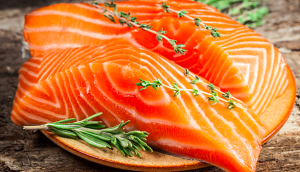
Foods are good for the brain.

A healthy and well-balanced diet is crucial for supporting brain function. Here are some foods that are considered beneficial for the brain:
Fatty Fish for The Brain:

Yes, fatty fish is indeed considered good for the brain. Fatty fish such as salmon, trout, and sardines are rich sources of omega-3 fatty acids, particularly EPA (eicosapentaenoic acid) and DHA (docosahexaenoic acid). These omega-3 unsaturated fats assume an essential part in cerebrum well-being and capability. Here's why:
Omega-3 Fatty Acids:
The brain is made up of about 60% fat, and omega-3 fatty acids are an integral part of the cell membranes in the brain. DHA, specifically, is tracked down in high fixations in the cerebrum and is significant for keeping up with its design and working with correspondence between synapses.
Anti-Inflammatory Properties:
Omega-3 fatty acids have anti-inflammatory effects, and chronic inflammation is believed to contribute to cognitive decline and various neurological disorders. Devouring omega-3-rich food sources can assist with lessening aggravation in the mind.
Neuroprotective Effects:
Some studies suggest that omega-3 fatty acids may have neuroprotective properties, helping to safeguard the brain against age-related decline and diseases like Alzheimer's.
Improved Cognitive Function:
Satisfactory admission of omega-3 unsaturated fats has been related to better mental capability, including memory and critical thinking abilities.
To reap the brain-boosting benefits of fatty fish, it's recommended to include them in your diet regularly. The American Heart Association recommends eating at least two servings of fatty fish per week. However, if you have concerns about mercury content in fish, you may want to choose varieties that are lower in mercury, such as salmon and sardines, while still obtaining the benefits of omega-3 fatty acids. As usual, individual dietary requirements might differ, and it's prudent to talk with a medical services professional for customized guidance.
Blueberries:

How do we ensure a safe and secure environment?
Yes, blueberries are considered beneficial for the brain health. They are rich in various compounds that contribute to cognitive function and may help protect the brain. Here are some reasons why blueberries are often highlighted as a brain-boosting food:
Antioxidants:
Blueberries are packed with antioxidants, including flavonoids, such as anthocyanins. Cell reinforcements assist with combatting oxidative pressure and diminish irritation, the two of which are significant for mind well-being.
Improvement in Memory and Cognitive Function:
Some studies suggest that regular consumption of blueberries may be associated with improvements in memory and cognitive performance. The cell reinforcements in blueberries might assume a part in safeguarding the mind from age-related decline.
Anti-Inflammatory Properties:
Chronic inflammation is believed to contribute to cognitive decline and neurodegenerative diseases. The anti-inflammatory effects of blueberries may help mitigate this risk.
Rich in Vitamins and Nutrients:
Blueberries contain various vitamins and nutrients, including vitamin C, vitamin K, and fiber, which contribute to overall health and may indirectly support the brain function.
Blood Flow Improvement:
Certain compounds in blueberries may help improve blood flow to the brain, which is essential for optimal cognitive function.
It's important to note that while blueberries are a nutritious addition to a well-balanced diet, they are just one part of a broader approach to the brain health.
Devouring various supplement-rich food sources, remaining hydrated, and keeping a sound way of life, including normal activity and adequate rest, are immeasurably significant elements in supporting general mental capability.
Integrating blueberries into your eating routine, whether new, frozen, or in different structures, can be a delicious and nutritious method for adding to your mind’s well-being. However, individual dietary needs may vary, and it's advisable to consult with a healthcare professional or a registered dietitian for personalized advice based on your specific health conditions and goals.
Broccoli:

Yes, broccoli is considered a brain-healthy food due to its rich nutritional profile. It contains different nutrients, minerals, and cell reinforcements that add to by and large well-being, including mind capability. Here are some reasons why broccoli is often highlighted as a beneficial food for the brain:
Antioxidants:
Broccoli is a rich source of antioxidants, including vitamin C and various phytonutrients. Cell reinforcements assist with shielding the cerebrum from oxidative pressure, which is connected to mature-related mental deterioration and neurodegenerative illnesses.
Vitamin K:
Broccoli is a good source of vitamin K, which is important for forming sphingolipids, a type of fat densely packed into the brain cells. Vitamin K is accepted to assume a part in supporting mental well-being and mental capability.
Choline:
Broccoli contains choline, a nutrient that is a precursor to acetylcholine, a neurotransmitter involved in mood and memory regulation. Adequate choline intake is essential for the brain health.
Folate (Vitamin B9):
Broccoli is a good source of folate, a B vitamin that plays a role in the brain development and function. Folate deficiency has been associated with cognitive decline.
Anti-Inflammatory Properties:
The compounds found in broccoli have anti-inflammatory effects, which may contribute to reducing inflammation in the brain. Persistent aggravation is related to different neurological problems.
Dietary Fiber:
Broccoli is rich in dietary fiber, which supports overall gut health. There is arising research demonstrating an association between stomach well-being and cerebrum well-being, proposing that a solid stomach microbiota may emphatically impact mental capability.
Including broccoli and other cruciferous vegetables in your diet can be a nutritious way to support your brain health. Likewise, with any food, it's critical to have an even eating regimen that incorporates various supplement-rich food sources. If you have specific dietary concerns or health conditions, it's advisable to consult with a healthcare professional or a registered dietitian for personalized advice.
Pumpkin Seeds:

Yes, pumpkin seeds are considered good for brain health due to their nutrient-rich composition. Here are some reasons why pumpkin seeds are often regarded as beneficial for the brain:
Rich in Magnesium:
Pumpkin seeds are an excellent source of magnesium, a mineral that plays a crucial role in various brain functions. Magnesium is involved in neurotransmitter release and helps support overall brain health.
Zinc Content:
Pumpkin seeds are also a good source of zinc, an essential mineral that is important for cognitive function. Zinc is engaged with synaptic capability and plays a part in learning and memory.
Omega-3 Fatty Acids:
While not as rich in omega-3 fatty acids as some other sources like fatty fish, pumpkin seeds do contain these beneficial fats in moderate amounts. Omega-3s are fundamental for keeping up with the design and capability of synapse films.
Antioxidants:
Pumpkin seeds contain antioxidants, including vitamin E and carotenoids, which help protect cells from oxidative stress. This can be valuable for general mind well-being and may add to the anticipation of old enough related mental deterioration.
Protein and Amino Acids:
Pumpkin seeds are a good source of plant-based protein and various amino acids. Proteins and amino acids are fundamental for the development of synapses, which assume a significant part in cerebrum capability.
Iron:
Pumpkin seeds contain iron, which is important for carrying oxygen to the brain. Lack of iron can prompt mental disabilities and diminished mental execution.
Tryptophan:
Pumpkin seeds contain tryptophan, an amino acid that serves as a precursor for serotonin, a neurotransmitter associated with mood regulation.
To incorporate pumpkin seeds into your diet, you can enjoy them as a snack, add them to salads, or yogurt, or blend them into smoothies. Remembering different supplements and thick food sources for your eating regimen is vital to supporting by and large mind well-being. As usual, individual dietary necessities might differ, and it's fitting to talk with a medical service proficient or an enlisted dietitian for customized exhortation in light of your particular ailments and objectives.
Dark Chocolate:

How to remove kidney stones naturally?
Yes, dark chocolate, when consumed in moderation and with a high cocoa content, is considered to have potential benefits for the brain. Here are some reasons why dark chocolate is often associated with brain health:
Flavonoids:
Dark chocolate is rich in flavonoids, which are a type of antioxidant. Cancer prevention agents assist with safeguarding cells, remembering those for the mind, from oxidative pressure and aggravation.
Improved Blood Flow:
Some studies suggest that dark chocolate may contribute to improved blood flow, including to the brain. Enhanced blood flow can support overall vascular health, which is crucial for cognitive function.
Caffeine Content:
Dark chocolate contains a moderate amount of caffeine, a natural stimulant that can temporarily enhance alertness and concentration.
Enhanced Mood:
Dark chocolate contains compounds that can trigger the release of endorphins, the "feel-good" hormones. Also, it contains serotonin forerunners, which might add to a better state of mind.
Cognitive Function:
The flavonoids in dark chocolate have been linked to potential improvements in memory and cognitive function. In any case, it's essential to take note that more examination is expected to comprehend the degree of these impacts completely.
While dark chocolate can be a part of a healthy diet, it's crucial to consume it in moderation, as it is still calorie-dense and may contain added sugars and fats. When choosing dark chocolate, opt for varieties with higher cocoa content, as these tend to have more flavonoids and fewer added sugars.
It's worth noting that milk chocolate, which contains lower cocoa content and more added sugars and fats, may not offer the same potential benefits for the brain health as dark chocolate.
As with any food, individual responses may vary, and it's advisable to consult with a healthcare professional or a registered dietitian for personalized advice based on your specific health conditions and goals.
Nuts:

Yes, nuts are considered good for the brain health due to their nutrient-rich composition. Here are some reasons why nuts are often regarded as beneficial for the brain:
Omega-3 Fatty Acids:
Certain nuts, such as walnuts, are rich in alpha-linolenic acid (ALA), a type of omega-3 fatty acid. Omega-3s are fundamental for cerebrum well-being and assume a part in mental capability.
Antioxidants:
Nuts contain antioxidants, including vitamin E, which help protect cells from oxidative stress. Cancer prevention agents add to general cerebrum well-being by lessening irritation and forestalling harm to cells.
Vitamins and Minerals:
Nuts are a good source of various vitamins and minerals that support brain function. For instance, they contain vitamin E, folate, magnesium, and zinc, which are basic for mental thriving.
Solid Fats:
Nuts are high in monounsaturated and polyunsaturated fats, which are viewed as heart-sound fats. These fats support by and large cardiovascular wellbeing, including blood stream to the cerebrum.
Protein:
Nuts give a wellspring of plant-based protein, which is significant for the creation of synapses and the general capability of the cerebrum.
Fiber:
Nuts are rich in dietary fiber, which supports gut health. Emerging exploration suggests a relationship between stomach prosperity and frontal cortex prosperity, showing that a strong stomach microbiota may determinedly influence mental capacity.
Phosphorus:
Some nuts, such as almonds, are good sources of phosphorus, a mineral that plays a role in the brain cell maintenance and repair.
It's vital to take note that while nuts are nutritious, they are likewise calorie-thick, so segment control is critical, particularly assuming you are aware of your calorie admission. A small handful of nuts (about 1 ounce) several times a week can be a part of a balanced diet.
Consolidating various nuts, like almonds, pecans, pistachios, and others, can give various supplements and flavors. As usual, individual dietary necessities might shift, and it's prudent to talk with a medical service proficient or an enrolled dietitian for customized counsel given your particular medical issue and objectives.
Eggs:

Yes, eggs are considered good for brain health because they are a nutrient-rich food containing various essential nutrients that support cognitive function. Here are some reasons why eggs are often regarded as beneficial for the brain:
Choline:
Eggs are an excellent source of choline, a nutrient that is a precursor to acetylcholine, a neurotransmitter involved in mood and memory regulation. Sufficient choline admission is significant for generally speaking mind wellbeing.
Vitamins B6 and B12:
Eggs contain vitamins B6 and B12, which play essential roles in brain health. These nutrients are engaged with the development of synapses and the upkeep of solid nerve cells.
Omega-3 Fatty Acids:
Eggs, especially those from chickens fed a diet high in omega-3s, can be a source of omega-3 fatty acids. Omega-3s are critical for frontal cortex prosperity, supporting the plan and ability of neural connection layers.
Protein:
Eggs are a rich source of high-quality protein, which is crucial for the production of neurotransmitters and the overall function of the brain.
Antioxidants:
Eggs contain antioxidants such as lutein and zeaxanthin, which are beneficial for eye health and may have positive effects on cognitive function.
Vitamins and Minerals:
Eggs are a decent wellspring of different nutrients and minerals, including vitamin D, vitamin A, and iron, which add to general well-being and may by implication support cerebrum capability.
It's important to note that the majority of nutrients are found in the egg yolk, so consuming the whole egg provides the most comprehensive nutritional benefits.
While eggs can be a nutritious addition to a balanced diet, individual dietary needs may vary. If you have specific dietary concerns or health conditions, it's advisable to consult with a healthcare professional or a registered dietitian for personalized advice based on your specific circumstances.
Oranges:

What happens to the body if urination is retained for a long time?
Yes, oranges and other citrus fruits are considered good for the brain health. Here are some reasons why oranges are often regarded as beneficial for the brain:
Vitamin C:
Oranges are rich in vitamin C, a powerful antioxidant. Antioxidants help protect the brain from oxidative stress, which is linked to age-related cognitive decline and neurodegenerative diseases.
Folate (Vitamin B9):
Oranges contain folate, an essential B vitamin that plays a role in brain development and function. Folate deficiency has been associated with cognitive decline.
Polyphenols:
Citrus fruits, including oranges, contain polyphenols, which are plant compounds with antioxidant and anti-inflammatory properties. These properties contribute to overall brain health.
Hydration:
Oranges have a high water content, contributing to hydration. Proper hydration is essential for maintaining optimal cognitive function.
Flavonoids:
Oranges also contain flavonoids, a group of compounds with potential cognitive benefits. Flavonoids may help improve blood flow to the brain and have neuroprotective effects.
Low Glycemic Index:
Oranges have a relatively low glycemic index, meaning they release glucose into the bloodstream slowly. This provides a steady supply of energy to the brain, supporting cognitive function.
Including a variety of fruits, including oranges, in your diet as part of a well-balanced and nutrient-rich meal plan can contribute to overall brain health. As always, individual dietary needs may vary, and it's advisable to consult with a healthcare professional or a registered dietitian for personalized advice based on your specific health conditions and goals.
Pumpkin:
https://livewithgreen.com/what-foods-are-good-for-the-brain/
.jpg)